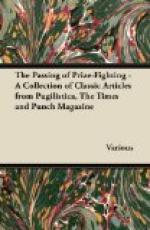The Commandant was not inwardly afraid; he was innately polite. He talked pleasantly to his vis-a-vis. The Corporal, a trifle abashed at first, listened deferentially, but as the good food enlivened him he ceased to be abashed and became cordial. From cordial he became affable, from affable affectionate, and from affectionate he passed to that degree of friendship in which you lean across the dinner-table, tap a man on the shoulder and call him “old pal.” Finally, he insisted upon the Commandant cracking with him a bottle of champagne. I give the Commandant full marks for not persisting in his refusal.
A draught or two of champagne has, as you may be aware, the effect of developing to an extreme any friendly feelings you may at the moment happen to possess ...
The train chanced to stop just after dinner was finished, and the Commandant, seizing his opportunity, hurriedly paid his bill and got into another carriage. My vis-a-vis also left the car, though I must confess that I had not stood him so much as a glass of beer. I and the Canadian Corporal were left facing each other, and the position was such that I couldn’t avoid his eye. I had no feelings with regard to him, but I simply could not smile at him, since I do not like champagne. So I suppose I must have frowned at him; anyhow, he came along and sat down at my table in order to explain at length that he was not drunk.
He wasn’t drunk, and I had never said he was, and I was not in the least interested in his theme, until he got to the point of what his main reason was for not being drunk. This, I admit, interested me deeply. “When we get to Parry,” said he, “we shall be met by Military Police, and they will ask to see our papers. And if my papers weren’t in order and if I wasn’t in order myself I should be put under arrest and sent back again. And I don’t mean to be sent back, and I have all my papers in order and I’m in order myself.” And, dash it all, the fellow was right, and when we got to the Gare du Nord there were the Military Police as large as life, and clearly there was no avoiding them.
At first I didn’t quite know what to do about it, but a little thought decided me. “There are your M.P.,” I said to the Corporal, as we trooped slowly out of the dining-car. “I’m afraid I’ll have to ask you to come along with me and interview one of them.” Giving him no time to argue, I led him straight to the Police Sergeant and insisted upon this case being dealt with before all others. “I must ask you, Sergeant, to make this man produce his papers. I have reason to doubt whether he is in order.”




